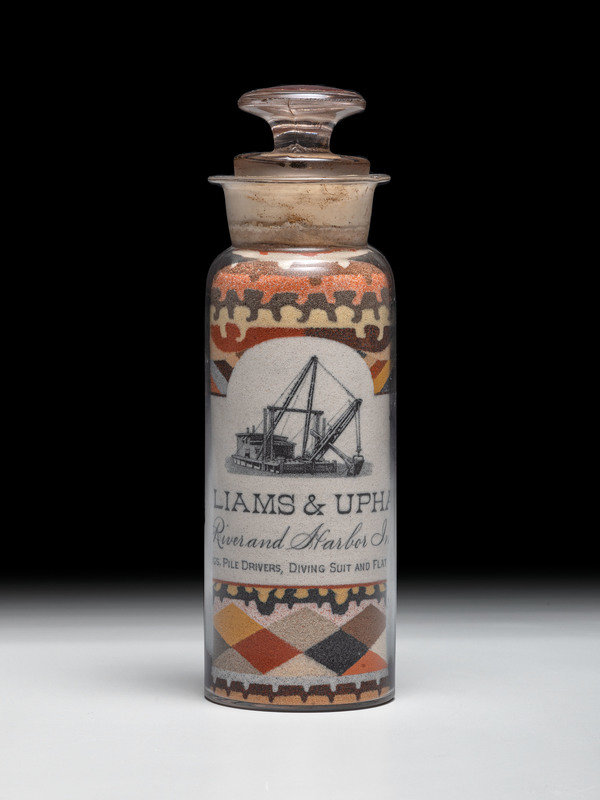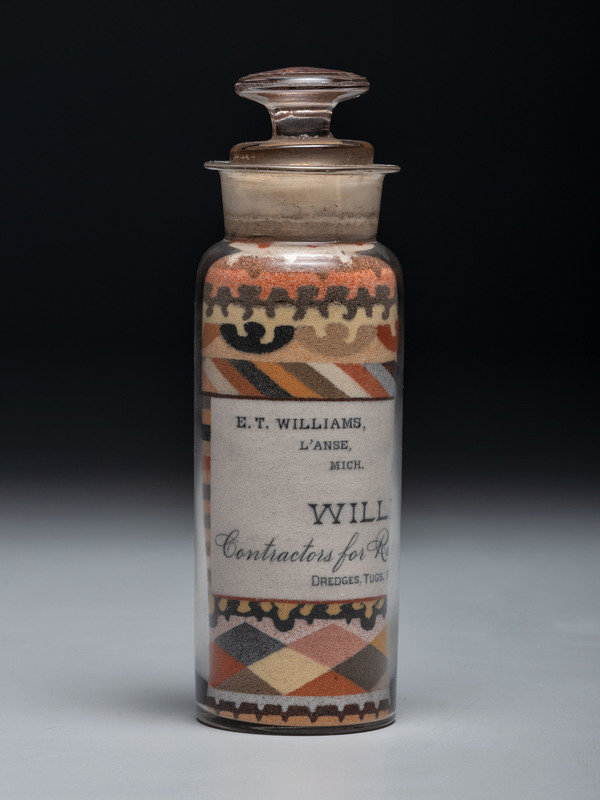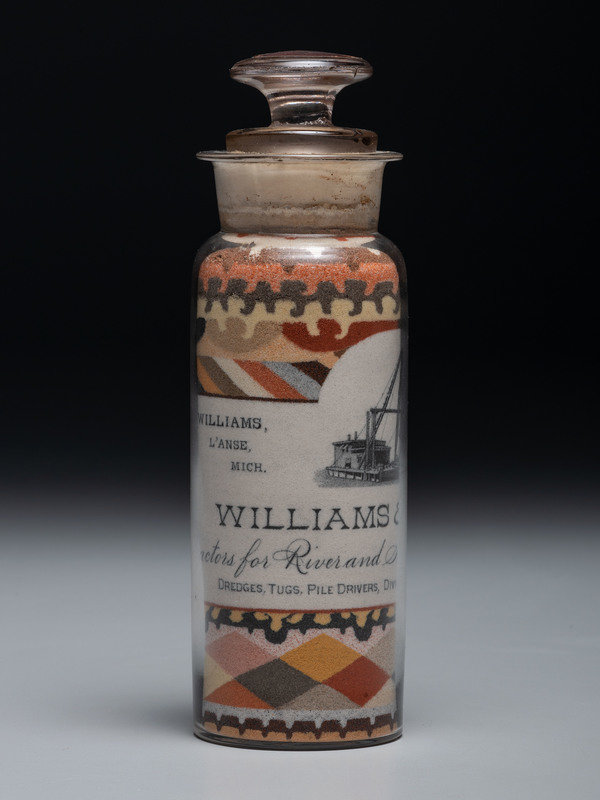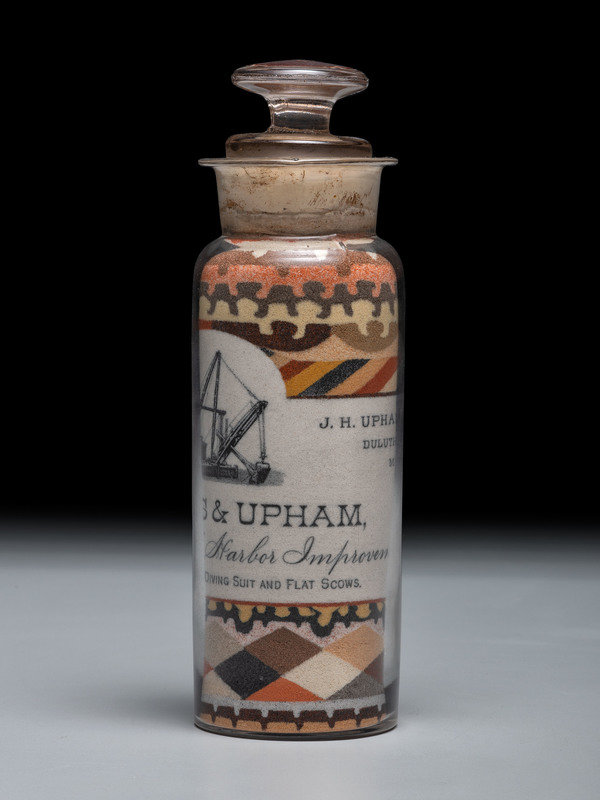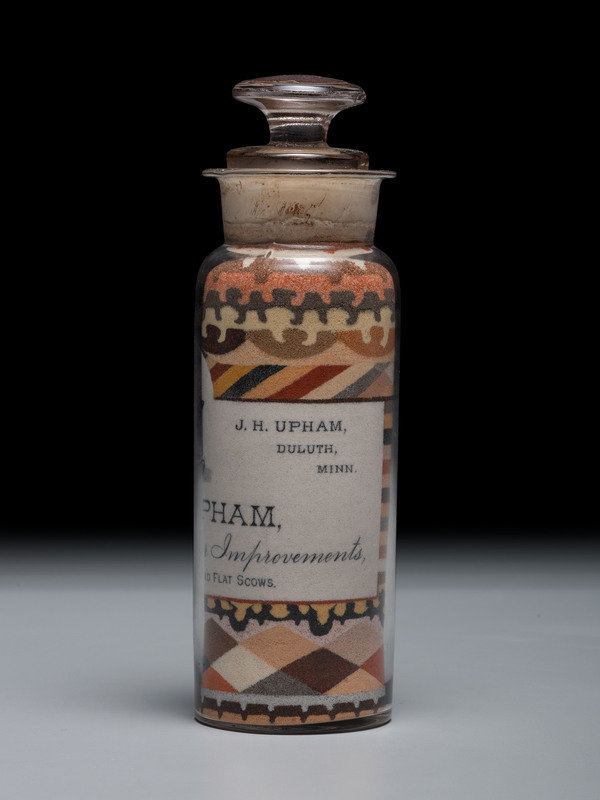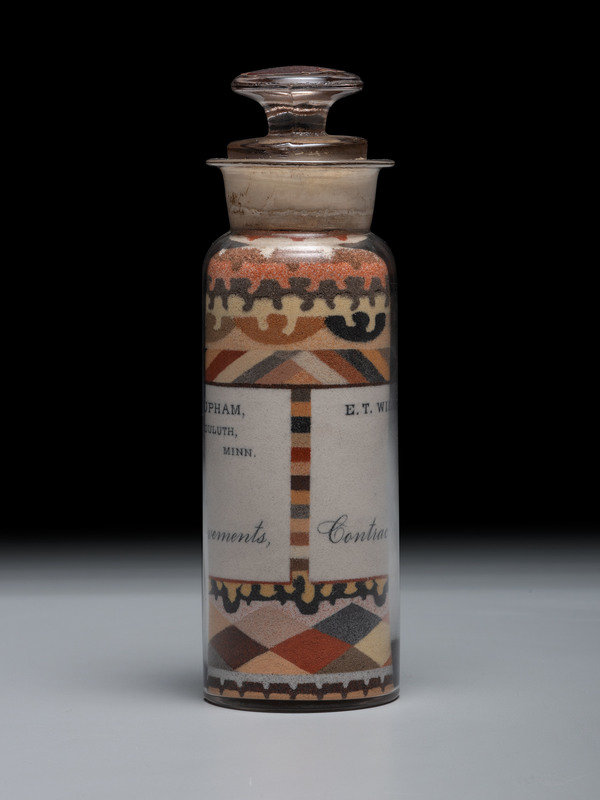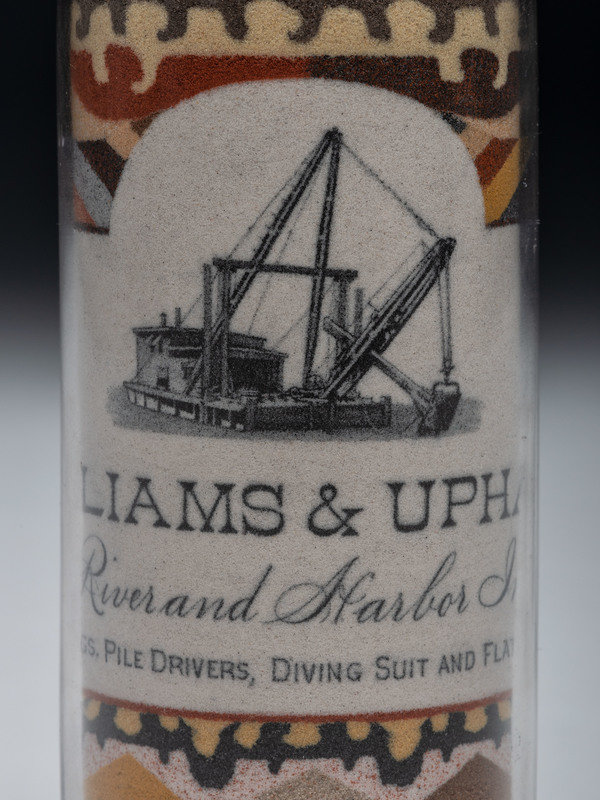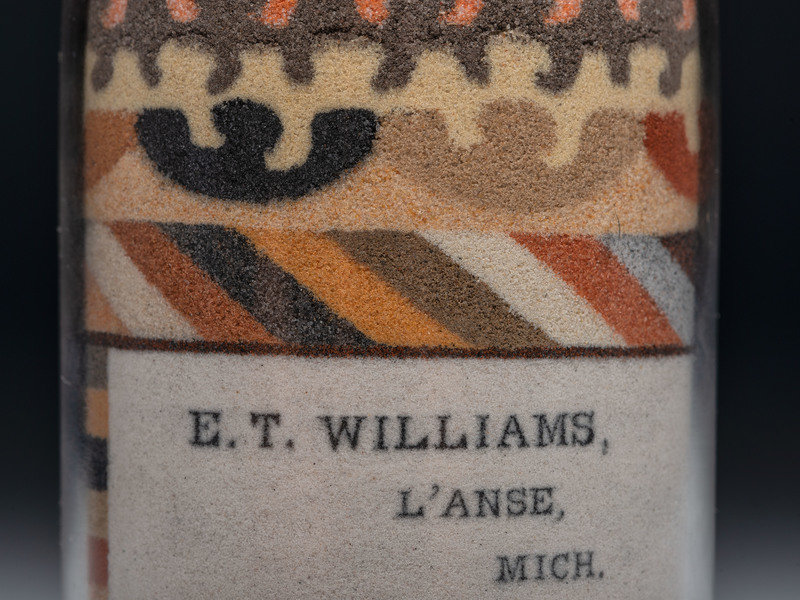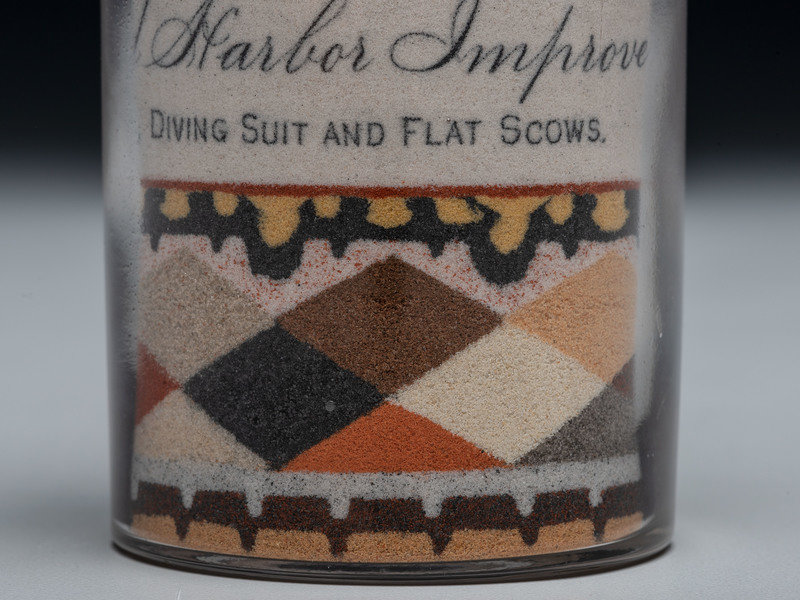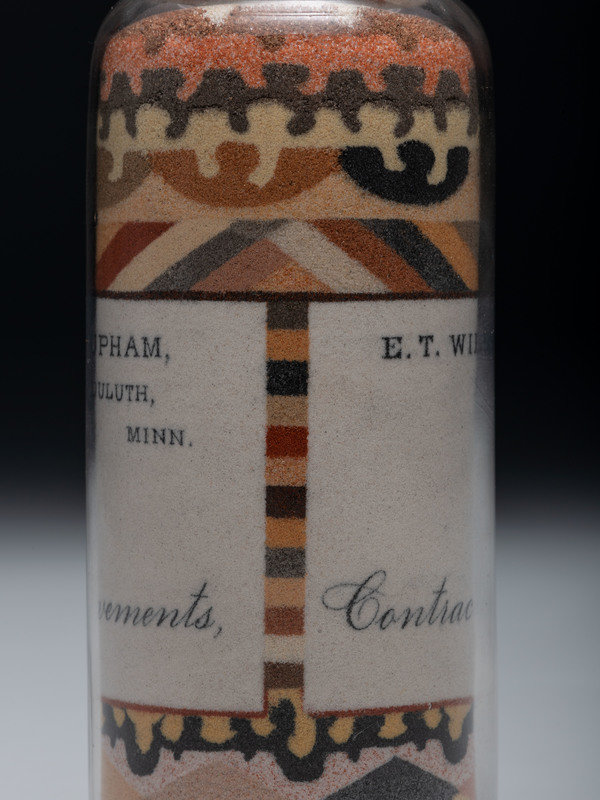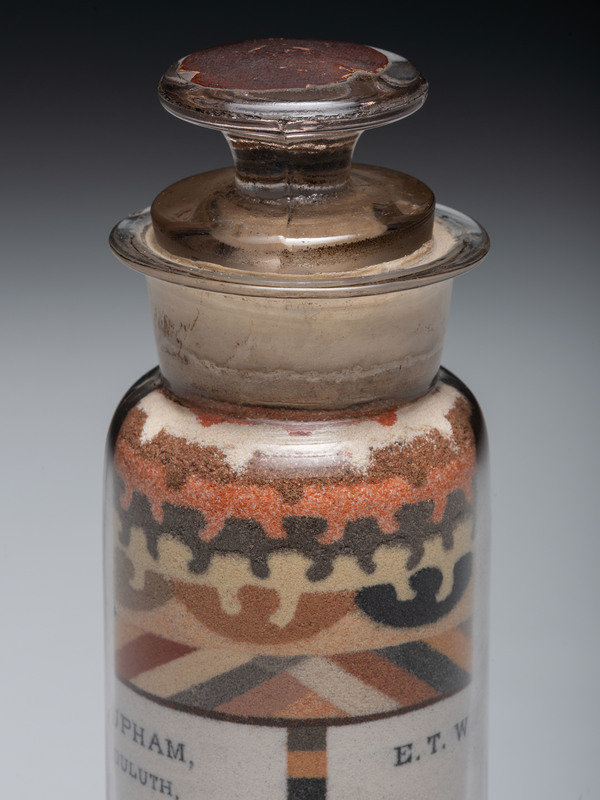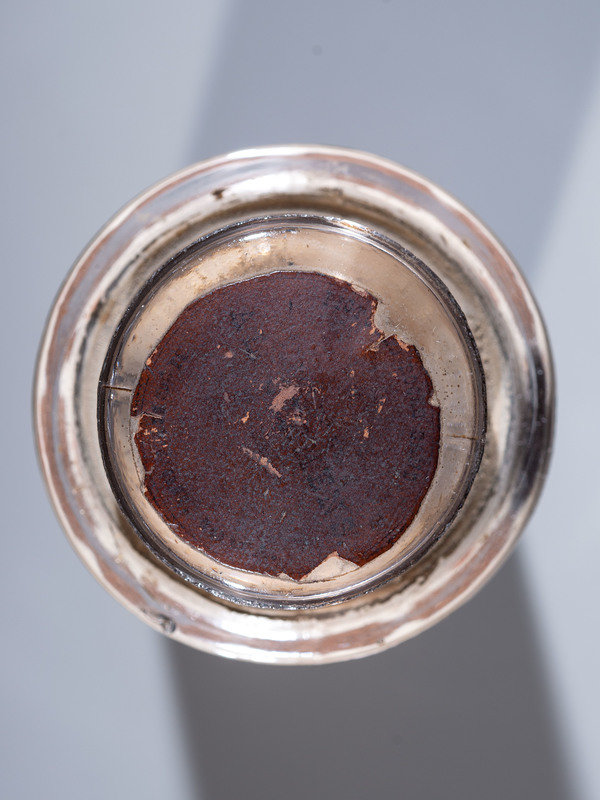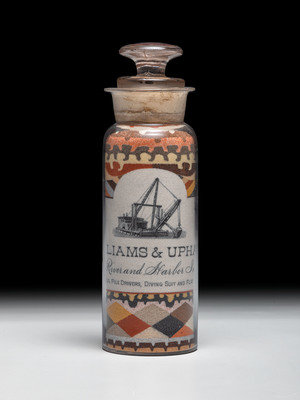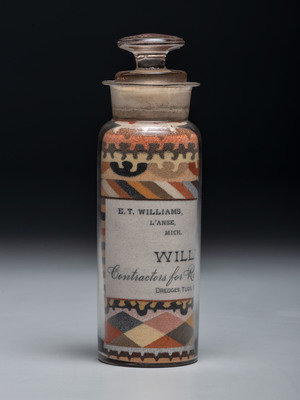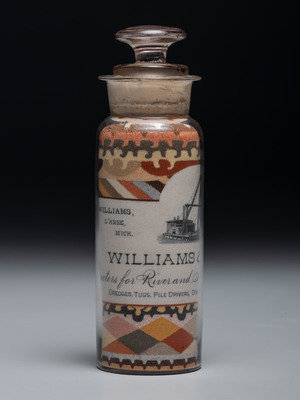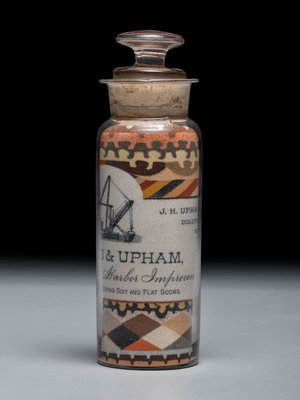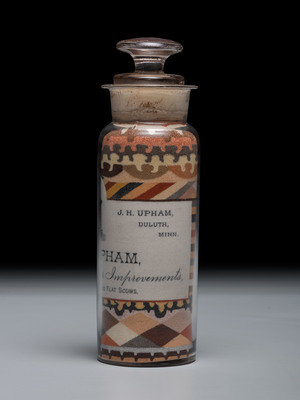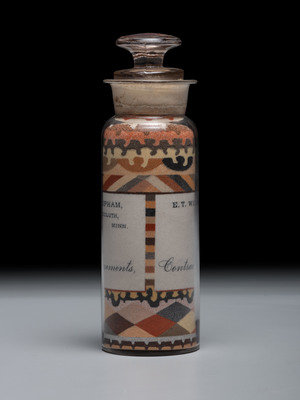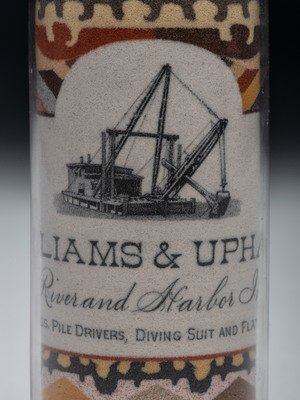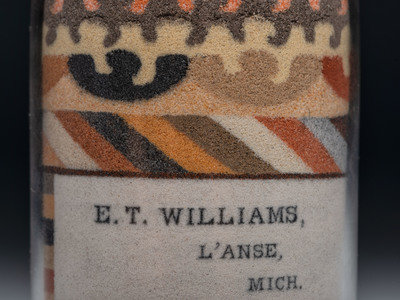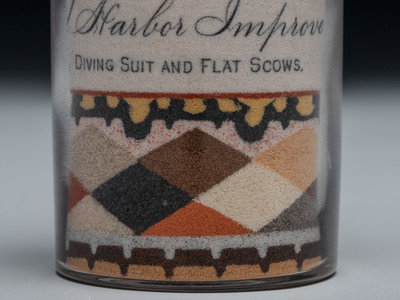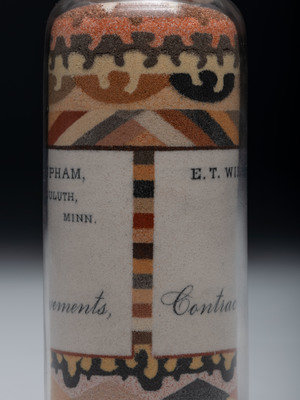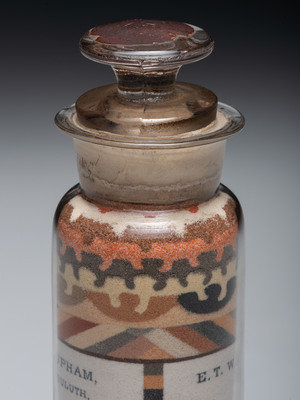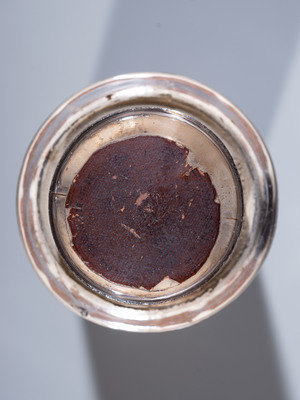Lot 1164
An Andrew Clemens (American, 1857-1894) Williams and Upham Contractors for River and Harbor Improvements Sand Bottle
Sale 1060 - American Furniture, Folk & Decorative Arts
Lots 1001-1304
Sep 14, 2022
10:00AM ET
Lots 1305-1582
Sep 15, 2022
10:00AM ET
Live / Cincinnati
Own a similar item?
Estimate
$100,000 -
150,000
Price Realized
$860,000
Sold prices are inclusive of Buyer’s Premium
Lot Description
An Andrew Clemens (American, 1857-1894) Williams and Upham Contractors for River and Harbor Improvements Sand Bottle
Commissioned by Ezra Williams, Circa 1883-1884
with paper label to top of stopper reading Pictured Rock Sand, Put Up By Andrew Clemens, Deaf-Mute, McGregor, Iowa.
Height with stopper 8 3/4 inches.
Height without stopper 7 1/2 inches.
Diameter 2 3/4 inches.
Height with stopper 8 3/4 inches.
Height without stopper 7 1/2 inches.
Diameter 2 3/4 inches.
Provenance:
Ezra Thompson Williams (1839-1919);
to his youngest son, Louis Ezra Williams (1879-1947);
to his eldest daughter, Harriet Isabelle (Williams) Harrison (1905-1959);
to her youngest son, Gordon Louis Harrison (1938-2013);
to his son, Jeffery Gordon Harrison;
to the present owners.
The bottle features a nearly continuous band of text in four fonts, including script, all on a white ground, reading Williams & Upham / Contractors for River and Harbor Improvements, / Dredges, Tugs, Pile Drivers, Diving Suit and Flat Scows. Over this is an image of a dipper dredge, flanked by E.T. Williams, L'Anse, Mich. and J.H. Upham, Duluth, Minn.
Above and below are geometric and swirled bands of colored sand, characteristic of Clemens.
Ezra T. Williams was born in Cazenovia, New York in 1839 to farmers Joseph and Calista Williams. By age 18, he had moved to Geneva, on Seneca Lake, and began his harbor improvement career with the firm Barton & Williams (no apparent relation). A year later, he moved to Keweenaw County, Michigan to work for the firm on a project connecting Portage Lake with Lake Superior. In 1863, Williams was able to buy into the business. In 1874, Mr. John H Upham, an employee and partial owner of Williams & Co. (he bought in in 1870), became an equal partner.
John Henry Upham was also born in New York, in Fayetteville outside Syracuse in 1841. In 1862, he enlisted in the 149th New York Infantry. He served until the end of the Civil War – was wounded at Gettysburg, became Captain of the 107th U.S. Colored Infantry, recruited in Kentucky and was ultimately given the title of Major by brevet in 1865. After the War, he settled in Duluth, Minnesota and began contracting for river and harbor improvements along Lake Superior.
The establishment of their partnership was followed by a period of continued professional and financial success, with the regular awarding of government and private contracts being reported in the regional newspapers from 1874 through the late 1880s. The company was chosen by the Northern Pacific Railroad Company to build their dock at Superior City in 1881, at a time when a railroad contract was a major stepping stone in the company’s growth. The History of the Upper Peninsula of Michigan, published in 1883 by The Western Historical Company, lists the partners as owning “six steam dredges, three tugs, the Eliza Williams, F.L. Danforth and J.H. Upham, Jr. They have also a full set of diving apparatus. They give employment during the working season to an average of seventy-five men. Their head office is at Duluth, Minn.”
According to Duluth city directories, the company was listed as Williams, Upham & Co. by 1885. From 1882-1884, the company appears as Williams & Upham, so it is reasonable to believe that the bottle was commissioned during this period. 1881-1882 was a period of particular success for the partnership, with the railroad contract, and the building of a new large dredge boat to correspond with the project. (St Paul Sunday Globe, Nov. 27th, 1881). The text on this bottle features nearly identical wording, and placement, as an advertisement for Williams and Upham, published in R.L. Polk & Co.’s Marine Directory of the Great Lakes in 1884, which would point to it as a possible design inspiration for Clemens. By this point in Clemens’ career, the complexity of this design was well within his capabilities, as is evidenced by other known pictorial bottles from the early 1880s. This bottle was a custom order and is similar to commissioned bottles made by Clemens for clients far from McGregor, Iowa, demonstrating his reputation beyond that Mississippi River town.
Clemens’ visual source for the dipper dredge on the bottle is unfortunately unknown. It may have come from a print ad, but such an ad or its printed image source has not been located. However, several period photos show similar looking vessels belonging to the company that might have served as inspiration. An 1871 photograph shows the tug Ishpeming, owned by W.W. Williams & Co. and operated by John Upham, digging the Duluth Ship Canal. A later photo, circa 1888, shows multiple William, Upham & Co. employees on a company dredge in Duluth.
According to the Duluth Evening Herald on October 13, 1890, J.H. Upham retired from the firm, although it continued under the name Williams, Daugherty & Upham until 1896, at which point the company was listed in directories as Williams, Green & Williams. Upham spent the rest of his life in Duluth, as a director of the American Exchange Bank, and serving on the city parks board. He was described as ‘one of the most prominent and enterprising citizens.’ (Upham Genealogy by F.K. Upham) According to Nancy S. Nelson and Tony Dierckins’ Duluth’s Historic Parks, Upham died in 1920 in Lawrenceburg, Tennessee but was buried in Duluth.
Clemens’ visual source for the dipper dredge on the bottle is unfortunately unknown. It may have come from a print ad, but such an ad or its printed image source has not been located. However, several period photos show similar looking vessels belonging to the company that might have served as inspiration. An 1871 photograph shows the tug Ishpeming, owned by W.W. Williams & Co. and operated by John Upham, digging the Duluth Ship Canal. A later photo, circa 1888, shows multiple William, Upham & Co. employees on a company dredge in Duluth.
According to the Duluth Evening Herald on October 13, 1890, J.H. Upham retired from the firm, although it continued under the name Williams, Daugherty & Upham until 1896, at which point the company was listed in directories as Williams, Green & Williams. Upham spent the rest of his life in Duluth, as a director of the American Exchange Bank, and serving on the city parks board. He was described as ‘one of the most prominent and enterprising citizens.’ (Upham Genealogy by F.K. Upham) According to Nancy S. Nelson and Tony Dierckins’ Duluth’s Historic Parks, Upham died in 1920 in Lawrenceburg, Tennessee but was buried in Duluth.
By 1902, Ezra T. Williams is listed in the Duluth city directory as a manager in the Lake Superior Contracting and Dredging Co. He had moved from L’Anse to Duluth by this time, after several years in Troy, New York and Chicago. By 1905/06, Williams had moved back to Chicago, where he passed away in 1910. The bottle then descended in his family, a unique testament to a long and successful career.
References:
Western Historical Company. The History of the Upper Peninsula of Michigan. Chicago, Illinois, 1883.
R. L. Polk & Co. Marine Directory of the Great Lakes. Detroit, Michigan, 1884.
Sucholeiki, Roy. The Sand Art Bottles of Andrew Clemens. North Carolina: McFarland & Company, Inc., 2015.
References:
Western Historical Company. The History of the Upper Peninsula of Michigan. Chicago, Illinois, 1883.
R. L. Polk & Co. Marine Directory of the Great Lakes. Detroit, Michigan, 1884.
Sucholeiki, Roy. The Sand Art Bottles of Andrew Clemens. North Carolina: McFarland & Company, Inc., 2015.
Condition Report
Contact Information
Auction Specialist
